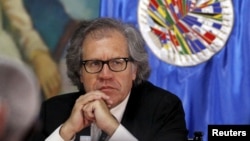A prominent diplomat is planning a politically sensitive trip to Cuba to accept an award from a pro-democracy group on the island.
Luis Almagro, secretary general of the Organization of American States, will travel to Cuba next week to accept the Oswaldo Paya Prize from the Latin America Youth Network for Democracy, a spokesman for the regional organization said Wednesday.
Spokesman Gonzalo Ezpariz confirmed Almagro's plans but declined to disclose details of a trip that could touch a nerve in Cuba, which has opened its economy to a degree but remains a one-party state and has had a rocky relationship with the OAS. He did not know whether Cuban authorities had issued a visa for the secretary general.
The Cuban Embassy in Washington had no immediate comment.
The prize is named for a leader of a movement that sought a referendum on free speech and other political freedoms. Paya died in a 2012 car crash that his family blames on the government. His daughter, Rosa Maria Paya, leads the group recognizing Almagro with an award intended to raise awareness about what it sees as abuses by the region's governments.
Almagro, a former foreign minister of Uruguay, received the daughter in his office in October, when they signed an agreement in which the OAS offered support to young activists in Latin America and the Caribbean and to expand efforts to promote human rights and civic participation in electoral processes around the region.
Cuban suspension
Cuba was suspended from the Washington-based Organization of American States in 1962. The suspension was annulled in 2009, but Cuba has not moved to rejoin the organization, which was created to promote regional cooperation but has been viewed by Havana as dominated by the United States.
Given that history, it would be unprecedented for an OAS secretary general to travel to the island to accept an award named for a Cuban dissident, said Cynthia Arnson, director of the Latin American Program at the Woodrow Wilson International Center for Scholars.
"It doesn't surprise me that there are doubts about whether the Cuban government will admit a high official to talk about internal democracy and human rights, subjects that are still very sensitive," Arnson said.
But Michael Shifter, president of the Inter-American Dialogue, said Havana would most likely provoke sharp reactions in Washington and elsewhere if it blocked Almagro's visit when the government of President Raul Castro is opening up more to the world with economic reforms and amid the restoration of formal relations with the United States.
"To receive a human rights prize in no way threatens the Cuban government," he said. "They won't be happy and they will criticize it, but they should let him in."




